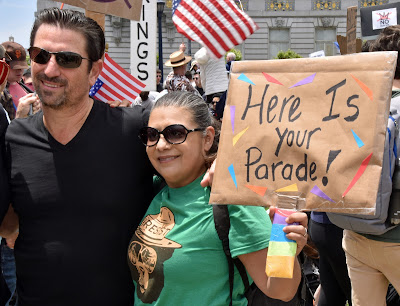I did live in New York City for a few years, way back in the hyper-energetic times of Mayor John Lindsay (1970-73) whose government epitomized the hope that a rich, diverse city could somehow have it all -- social peace, racial justice, and economic prosperity. Some look back on the moment with belated appreciation, while for others, it still seems a nadir of dysfunction. For a young person seeking her path, it was an exciting, if occasionally scary, backdrop to personal maturing. And then I got out in time not to witness the city's near insolvency and the blowback when the plutocrats reasserted their rule.
So I'm truly a remote observer of Zohran Mamdani's earthquake. Why NYC voters have dared to vote for someone/something new!
Evidently the money guys are terrified, reports Paul Waldman. Zohran has a excited a city they avoid noticing from their chauffeured limousines.
Mamdani Win Causes World's Whiniest Babies to Melt Down
... What exactly do these babies think
Mamdani is going to do if he becomes mayor? They don’t like that he’s a
democratic socialist; fair enough. Many of them just don’t like Muslims,
which is sadly predictable. But what do they think the mayor is going
to do that will be so catastrophic?
Granted, he has a lot of ambitious ideas in his platform.
He wants to make buses and childcare free for all New Yorkers, for
instance. Will that happen? Maybe, maybe not. It won’t be easy. But if
he managed it, would it make the city some kind of intolerable hellhole
for the rich?
... For many Americans, the idea that there are other Americans who feel
safe and happy in environments of racial and ethnic diversity just
doesn’t compute. Aren’t you supposed to only be comfortable around your
own tribe? Aren’t you supposed to feel aggrieved when you hear languages
other than English being spoken? For many people who have spent a lot
of time in urban environments, the answer is that diversity is precisely
what makes a place feel reassuring and comfortable.
That's sure what I learned living in New York and I eventually settled in the place most like NYC with less crowding that existed in that decade. (San Francisco might no longer play that role ... times and cities change.)
John Ganz at Unpopular Front tackles the touchy question of America's most Jewish city voting for a proud Muslim who supports Palestine:
... There
clearly was an effort to smear Mamdani with Jewish voters as an
antisemite, and it just didn’t work.
The guy just does not come across
as a hateful person. Also, New York has a population about the size of
Israel, except compared to them, we are practically a utopia, where
people of very different backgrounds live peacefully (if grumpily) side
by side. Let’s not introduce ethnic hatreds into a place where they are
largely successfully overcome.
And let me tell you a little secret: most
New York Jews really like New York’s diversity.
We like that it attracts the Mamdanis of the world. We like sharing it
with people of lots of different backgrounds. That’s what makes us feel
safe and happy here. Especially when they are such a mensch like him: a
nice college boy, his parents are a professor and a filmmaker, he went
to Bronx Science, and then to a liberal arts school.
I’m sorry, but you
are gonna have a hard time convincing liberal educated,
upper-middle-class Jews not to like a college-educated, left-leaning
immigrant—and one who tried to make a career in the arts?! Forget about
it. The guy is practically Jewish! Not to mention that his Muslim and
Indian identity is no doubt sincere, but it’s also largely cultural in a
way a lot of Jews recognize. ...
Ganz draws some conclusions which I think speak to how US voters might retrieve our democracy, if we get the chance. Most politicians, especially Democrats currently in the wilderness, have been mesmerized by messaging gurus who prescribe poll tested lines ... but mostly voters simply want someone who convinces them they can lead, in some new, better direction. That can be dangerous. Trump's success points up the danger of a democratic populace feeling adrift -- a whole lot of people are finding out that the Leader might be leading them over a cliff.
Ganz again:
The problem with the polling and all the emphasis on data in
contemporary politics is that it does not take into account that the
electorate doesn’t really exist until election day, and the politician
and his or her campaign are actively creating that
electorate. All political errors, from the level of action to analysis,
are based on reifying the situation, believing in a static, factual
reality that cannot be changed. And all great political successes are
based on the opposite: the art of the impossible; believing in a chance
for something new.
Once upon a quite recent time, Barack Obama came across as something new; we're open to a novel direction again. Let's make sure it is a good one.
















































%20nurses.jpg)





